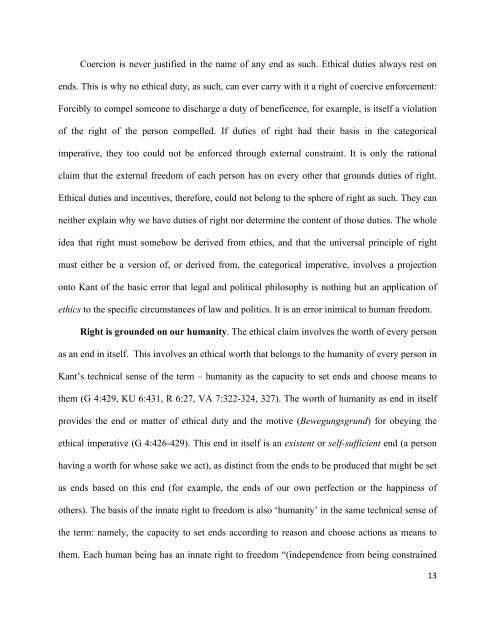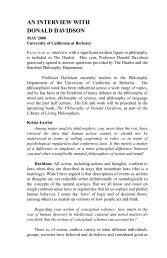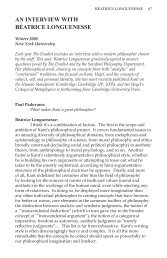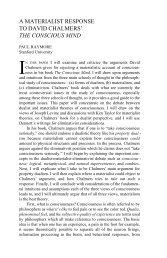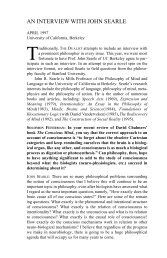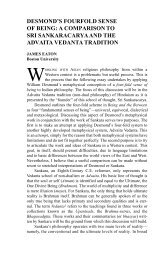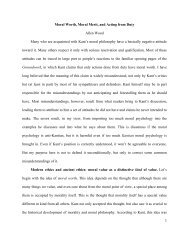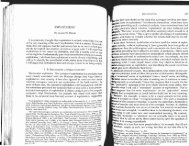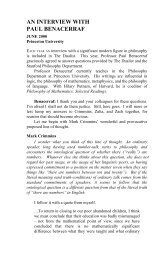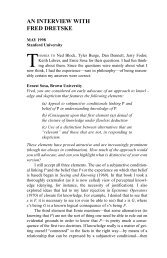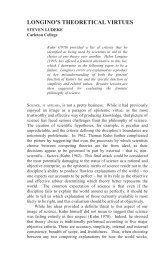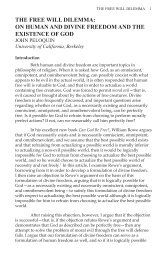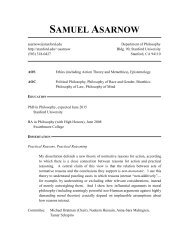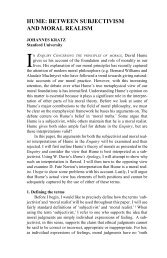The Independence of Right from Ethics Allen Wood Right and ethics ...
The Independence of Right from Ethics Allen Wood Right and ethics ...
The Independence of Right from Ethics Allen Wood Right and ethics ...
You also want an ePaper? Increase the reach of your titles
YUMPU automatically turns print PDFs into web optimized ePapers that Google loves.
Coercion is never justified in the name <strong>of</strong> any end as such. Ethical duties always rest onends. This is why no ethical duty, as such, can ever carry with it a right <strong>of</strong> coercive enforcement:Forcibly to compel someone to discharge a duty <strong>of</strong> beneficence, for example, is itself a violation<strong>of</strong> the right <strong>of</strong> the person compelled. If duties <strong>of</strong> right had their basis in the categoricalimperative, they too could not be enforced through external constraint. It is only the rationalclaim that the external freedom <strong>of</strong> each person has on every other that grounds duties <strong>of</strong> right.Ethical duties <strong>and</strong> incentives, therefore, could not belong to the sphere <strong>of</strong> right as such. <strong>The</strong>y canneither explain why we have duties <strong>of</strong> right nor determine the content <strong>of</strong> those duties. <strong>The</strong> wholeidea that right must somehow be derived <strong>from</strong> <strong>ethics</strong>, <strong>and</strong> that the universal principle <strong>of</strong> rightmust either be a version <strong>of</strong>, or derived <strong>from</strong>, the categorical imperative, involves a projectiononto Kant <strong>of</strong> the basic error that legal <strong>and</strong> political philosophy is nothing but an application <strong>of</strong><strong>ethics</strong> to the specific circumstances <strong>of</strong> law <strong>and</strong> politics. It is an error inimical to human freedom.<strong>Right</strong> is grounded on our humanity. <strong>The</strong> ethical claim involves the worth <strong>of</strong> every personas an end in itself. This involves an ethical worth that belongs to the humanity <strong>of</strong> every person inKant’s technical sense <strong>of</strong> the term – humanity as the capacity to set ends <strong>and</strong> choose means tothem (G 4:429, KU 6:431, R 6:27, VA 7:322-324, 327). <strong>The</strong> worth <strong>of</strong> humanity as end in itselfprovides the end or matter <strong>of</strong> ethical duty <strong>and</strong> the motive (Bewegungsgrund) for obeying theethical imperative (G 4:426-429). This end in itself is an existent or self-sufficient end (a personhaving a worth for whose sake we act), as distinct <strong>from</strong> the ends to be produced that might be setas ends based on this end (for example, the ends <strong>of</strong> our own perfection or the happiness <strong>of</strong>others). <strong>The</strong> basis <strong>of</strong> the innate right to freedom is also ‘humanity’ in the same technical sense <strong>of</strong>the term: namely, the capacity to set ends according to reason <strong>and</strong> choose actions as means tothem. Each human being has an innate right to freedom “(independence <strong>from</strong> being constrained13


